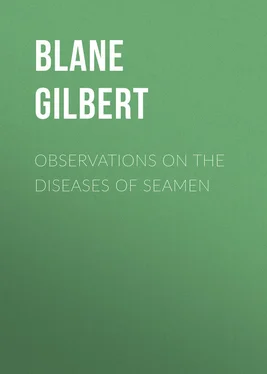Gilbert Blane - Observations on the Diseases of Seamen
Здесь есть возможность читать онлайн «Gilbert Blane - Observations on the Diseases of Seamen» — ознакомительный отрывок электронной книги совершенно бесплатно, а после прочтения отрывка купить полную версию. В некоторых случаях можно слушать аудио, скачать через торрент в формате fb2 и присутствует краткое содержание. Жанр: foreign_antique, foreign_prose, на английском языке. Описание произведения, (предисловие) а так же отзывы посетителей доступны на портале библиотеки ЛибКат.
- Название:Observations on the Diseases of Seamen
- Автор:
- Жанр:
- Год:неизвестен
- ISBN:нет данных
- Рейтинг книги:3 / 5. Голосов: 1
-
Избранное:Добавить в избранное
- Отзывы:
-
Ваша оценка:
- 60
- 1
- 2
- 3
- 4
- 5
Observations on the Diseases of Seamen: краткое содержание, описание и аннотация
Предлагаем к чтению аннотацию, описание, краткое содержание или предисловие (зависит от того, что написал сам автор книги «Observations on the Diseases of Seamen»). Если вы не нашли необходимую информацию о книге — напишите в комментариях, мы постараемся отыскать её.
Observations on the Diseases of Seamen — читать онлайн ознакомительный отрывок
Ниже представлен текст книги, разбитый по страницам. Система сохранения места последней прочитанной страницы, позволяет с удобством читать онлайн бесплатно книгу «Observations on the Diseases of Seamen», без необходимости каждый раз заново искать на чём Вы остановились. Поставьте закладку, и сможете в любой момент перейти на страницу, на которой закончили чтение.
Интервал:
Закладка:
The great benefit derived to the health of the fleet, from the change of climate, as well as other reasons, justified the Admiral in going to North America; and there was the more merit in this measure, as it was undertaken without precedent, and without instruction. Upon our return we found there was great good fortune in it, as well as wisdom; for there had happened on the 10th of October a more violent hurricane than any in the memory of man, and the ravage it made both by sea and land is, perhaps, unparallelled in history. Several of the ships of the line were exposed to it; but though they suffered extremely, and were in the utmost danger, none were lost. Two of them happened to be at Antigua, which was out of the track of this hurricane, as it extended only from the 12th to the 15th degree of N. latitude; so that the only islands that suffered by it were Barbadoes, St. Lucia, St. Vincent, and Martinico. – Four frigates, and as many sloops of war, either foundered or were wrecked, and about one thousand seamen perished in them. One of the buildings of the hospital at Barbadoes was entirely demolished by the impetuosity of the sea, which, having risen to a great height, dashed a ship against it, and twenty-three seamen were buried in the ruins 3.
The Montague suffered most on this occasion, and was also most subject to sickness and mortality, brought on in consequence of the great fatigue and hardships of the men in bringing her into port and refitting her; for the ship was almost torn to pieces both in the rigging and hull, and the bedding and other necessaries and conveniencies were entirely destroyed. The fever that prevailed on board at this time was of the most malignant kind known in this climate; and the worst cases arose in watering, and the other necessary duties on shore, from which the men would sometimes return frantic, and die in a few hours. There was a party of soldiers on board; and as they were not called upon to perform any duties on shore, they had but little sickness in companion of the sailors.
The other ships having suffered less from the storm, were also less sickly, as it was not necessary for them to remain so long in the unhealthy Carenage to repair.
The only disease that prevailed at this time, in these two ships, was fevers, there being few or no fluxes, though they had been so frequent in the former part of the year. Though fevers and fluxes depend on the same general causes, yet when these causes exist in a higher degree, it would appear that they are more apt to produce fevers. Thus the exhalations of the earth from marshes are more apt to produce fevers; and mere excesses of heat and cold, or moisture, are more apt to produce fluxes; just as in Europe a catarrh, which may be considered as a local febrile affection, as well as a dysentery, will be excited by exposure to cold or damp, without any specific bad quality in the air.
The Ajax and Montague are the only two ships of those left in the West Indies, which are included in the estimate of sickness and mortality in November and December, and they bear a very great proportion to the whole; for out of forty-four that died in fourteen ships of the line in November, twenty died in the Montague, and five in the Ajax; and out of forty-three, the whole number of deaths in December in twenty-one ships of the line, ten were of the Montague, and eleven of the Ajax.
CHAP. III
Account of the Health of the Fleet from January, 1781, till July, 1781, both Months included. – Arrival of seven Ships of the Line from England – Increase of Sickness in consequence of a Descent on St. Vincent’s – Long Cruise to windward of Martinico – Great Prevalence of Scurvy – Difference of Health in different Ships – New Ships not more unhealthy than others – Why Frigates are more healthy than Ships of the Line – Remarkable Cure of Scurvy in two Ships – Essence of Malt – Vegetables most antiscorbutic in their natural State – Advantage of supplying Refreshments on board of Ships in preference to Hospitals.
We are now come to that period in which our fleet was reinforced with seven ships of the line, which arrived at Barbadoes from England on the 5th of January, 1781, under the command of Lord Hood. This addition, with two which had arrived in November, made the force upon this station again amount to twenty-one ships of the line.
TABLE IVKEY:
B On board.
H Sent to the Hospital.
D Dead.
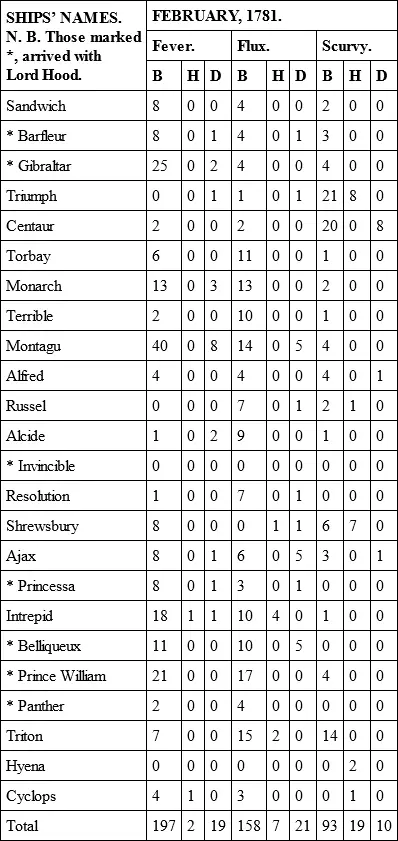

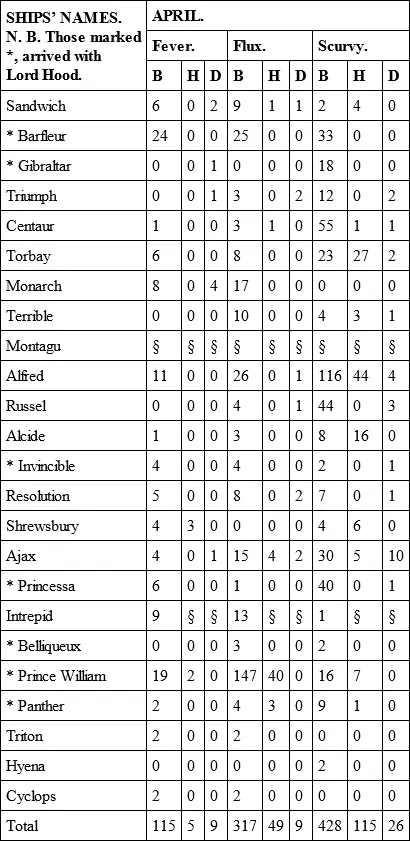
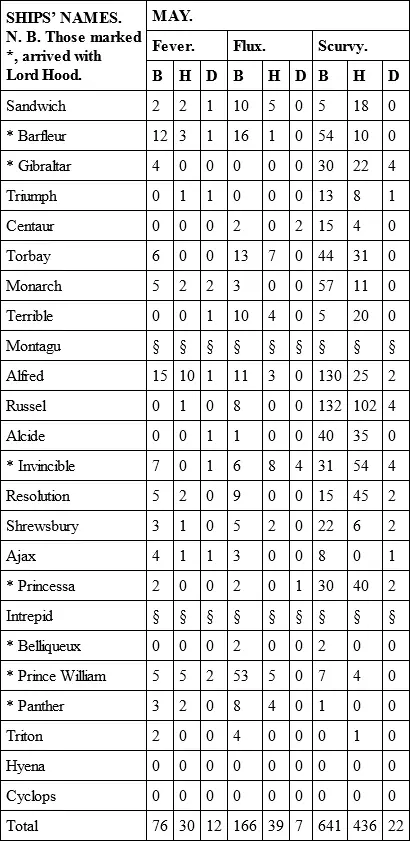
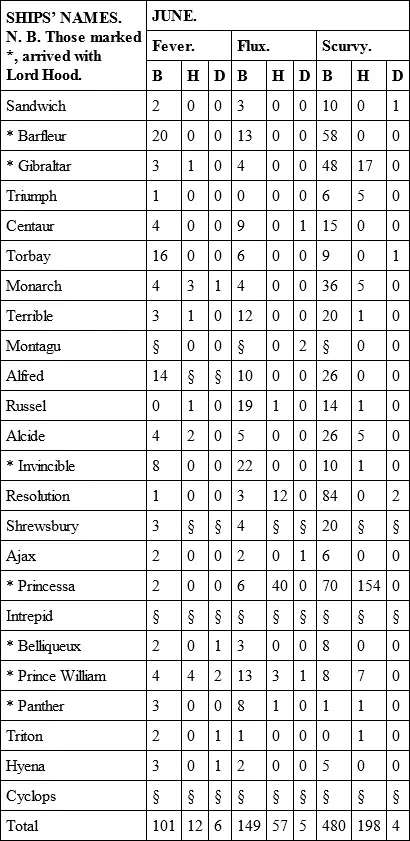
N. B. Where the Spaces are marked thus, §, no Return was made.
The whole fleet was tolerably healthy during this month, the season being dry and cool; there was, however, a small increase of sickness at this time, and it was owing to a descent made on St. Vincent’s in December. The soldiers, (of whom there was still a regiment on board of the fleet) the marines, and some of the seamen, had been on shore for one night only; but many of them having lain on the ground, some having been intoxicated, or having eaten to excess of sugar-cane and fruit, caught fevers and fluxes, which increased the proportion of diseases and deaths the following months, as appears by the Table.
I have exhibited, in another Table, a view of the sickness and mortality of this fleet for the five succeeding months. ( Table IV.) This account, as well as most of those that are to follow, is confined to three diseases, that may be called the sea epidemics. These are, fever, flux, and scurvy.
The whole fleet met at Barbadoes on the 13th of January, and no service was undertaken till the accounts of the Dutch war arrived on the 30th of that month. In consequence of this intelligence, the greater part of the ships of war went against St. Eustatius, which was taken on the 3d of February.
Ten days after this a squadron of seventeen ships of the line was sent to cruise to windward of Martinico, with a view to intercept a French squadron which was then said to be on its passage from Europe. The cruise was there continued for six weeks; after which small divisions of the ships were sent to water and refit, by turns, at St. Lucia, and were relieved by the ships left for the protection of that island.
Soon after this, the whole squadron came to leeward of Martinico; and though the former intelligence had proved false, the greater part of our fleet still kept the sea, in order to block up the enemy in Fort-Royal Bay. This they continued to do till the 29th of April, when a French fleet of twenty-two ships of the line, from Europe, joined by four from Martinico, forced their way into their own port, pushing to leeward our fleet, consisting only of eighteen ships of the line; so that the greater part of them did not get into port till they came to an anchor at Barbadoes on the 23d of May.
It was in this season of cruising, and keeping the sea, that the fleet contracted such a degree of scurvy as had never before been known in the West Indies. This disease is not so apt to arise in a hot climate as in a cold one; and the prevalence of it on this occasion was owing to the men having been for a great length of time upon sea victualling; for one part of the fleet had not had a fresh meal from the time of leaving America, that is, for six months; and that part of it which came last from England had been in the same circumstances for seven months; nor had any of them been in a place capable of supplying vegetable refreshments from the time they left Barbadoes in the end of January. But though no fresh meat or vegetables could be procured at St. Lucia or St. Eustatius, yet the scurvy did not make such progress in the ships that lay at anchor there, as in those that were at sea; and it appears that the time in which it prevailed most was, while the greatest number of ships was at sea, that is, in the month of March. It appears, indeed, by the Table, that there was a greater number ill of this complaint on the 1st of May than on the 1st of April; but it appears also, that more were sent to the hospital in March than in April, and very near half of the May list must have been taken ill in March 4. The difference of being in port and at sea consists chiefly, 1st, In there being plenty of water while in port, so that it can be used freely, not only to drink, but to wash the clothes; and we know that cleanliness tends greatly to ward off the scurvy. 2dly, Though no fresh meat nor vegetables could be procured at those ports, sugar, which may be considered as a very antiscorbutic article of diet, could always be procured at a very cheap rate, and the seamen, when in port, used to exchange their salt provisions for it. 3dly, There is at sea a dismal uniformity of life, favourable to indolence and sadness, and therefore tending to hasten the progress and aggravate the symptoms of the scurvy; whereas the change of scene and variety of objects, when in port, tend to cheer and recreate the mind, and thereby to avert this disease.
Читать дальшеИнтервал:
Закладка:
Похожие книги на «Observations on the Diseases of Seamen»
Представляем Вашему вниманию похожие книги на «Observations on the Diseases of Seamen» списком для выбора. Мы отобрали схожую по названию и смыслу литературу в надежде предоставить читателям больше вариантов отыскать новые, интересные, ещё непрочитанные произведения.
Обсуждение, отзывы о книге «Observations on the Diseases of Seamen» и просто собственные мнения читателей. Оставьте ваши комментарии, напишите, что Вы думаете о произведении, его смысле или главных героях. Укажите что конкретно понравилось, а что нет, и почему Вы так считаете.
